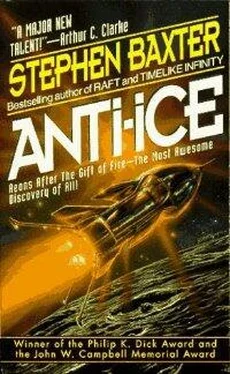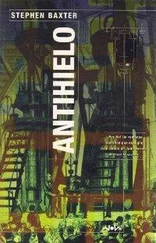Now it was Holden’s turn to laugh, but I sat quietly, thinking over Bourne’s words. I will admit that even a month earlier I would instinctively have sided with Holden in this debate, but now, hearing the cold, precise words of this Frenchie—no, of this man, a man about my own age—I found my old certitudes more fragile than I had supposed. “But,” I asked Bourne, “what if this is true? Is the British way so bad? Holden has described the Congress of Vienna; Britain’s diplomats have striven for a just peace—”
“I am French, not British,” he said. “We want to find our own destiny, not follow you to yours. The Prussians, and the rest of the Germans, too; if history says that fragmented nation is to unify, who is Britain to stand in the way? And even—even if our nations wish to go to war, then it is not for you to say ‘no’.” His face was pale, but his eyes were clear and steady.
“Then your taking of the Phaeton —perhaps ultimately at the expense of your own life—”
“—was an act designed to waste a few more pounds of the wretched anti-ice. To remove the reckless genius-criminal Traveller. It is known already that your stock of the substance is running low. There is no nobler way for a Frenchman to spend his life than to speed this process.”
Despite the starkness of this statement, I was irresistibly reminded of Traveller’s remarks to the effect that his purpose in building such great devices as the Albert was to distract the politicians and generals from the military exploitation of anti-ice! Was Bourne’s analysis of the situation really so different from that of the great Englishman?
I frowned. “Holden thinks you are a saboteur.”
He shook his head, smiling thinly. “No. I am a franc-tireur.”
“A what?”
“A free-shooter. A new type of soldier; a soldier in a gentleman’s clothes, who fights to free his homeland with any tools available.”
“Damn pretty sentiments,” Holden said with loathing and contempt. “And when the anti-ice is all gone—wasted by such acts as this—then what? Will you rise and murder us in our beds?”
Bourne’s smile widened. “You are so afraid, aren’t you, English? You fear even your own mobs, who perhaps might become infected by ours. And you understand so little.
“I heard Sir Josiah call himself an Anarchist.” He spat. “And in the same breath describe how each man will know his ‘place.’ Traveller and his like do not know the meaning of the words ‘free man.’ Was it not the industrialists who, in 1849, overturned Shaftesbury’s working conditions reforms of a few years earlier?”
I looked blankly at Holden, who raised a hand dismissively. “He means some aberrant pieces of legislation, Ned, long since thrown out and forgotten. Shaftesbury introduced a ten-hour working day limit, for example. Conditions on the use of women in the mines. That sort of thing.”
I was puzzled. “But industry could not function under such restraints. Could it?”
“Of course not! And so the ‘reforms’ were discarded.”
“But,” said Bourne, “at what cost to your British souls. Eh? Vicars, do you remember an English writer called Dickens?”
“Who?”
Again Holden explained, impatiently. Charles Dickens had turned out pot-boilers in the 1840s, achieving a brief popularity. Holden sighed briefly. “Do you remember Little Nell, Pocket?”
The manservant’s face creased to a smile. “Ah, yes, sir. Everyone followed the serials then, didn’t they? And when Nell died there was scarce a dry eye in the country, I dare say.”
“Dickens. I never heard of the fellow,” I admitted. “What happened to him?”
“About 1850 he began a new serial,” Holden remembered. “ David Copperfield. Another heavy, weepy work. It flopped completely, being utterly removed from the mood of the day. Ned, it was in that same year of 1850 that the first Light Rail, between Liverpool and Manchester, was opened! People were excited by the future—by change, enterprise, possibilities. They didn’t want to read this dreary stuff about the plight of the shiftless.”
“So,” said Bourne, “Dickens left Britain for good. He lived and worked in America, where his social awareness had long been appreciated; he campaigned on a variety of reform issues right up to his recent death.”
“What is your point?” I demanded coolly.
“That your British hearts are riven by internal contradiction—the same contradiction which expelled such a good man as Dickens from your body politic, leaving you the colder and the poorer. The contradiction which allows Traveller to believe that his Anarchism can be validly founded on a heap of laboring, disenfranchised poor. A contradiction which, in the end, will tear you apart—and a contradiction which now drives you to meddle in the affairs of other nations. Do you not fear that nationalism will erupt out of France and across Europe, disrupting your Balance of Power for ever—and do your mothers still frighten you as children with tales of how ‘Boney’ will get you if you misbehave?”
I laughed—for my own mother had done precisely that—but Bourne, excited, continued now in a harsher voice. “Ned, there is a strain of modern Englishmen called the Sons of Gascony. Are you familiar with their theories?”
“I have heard of them,” I admitted stiffly.
“The Sons are the distillation of your national character, in some ways; for, constantly aware of the past, they live in constant fear of it—and constantly plan revenge. After the Norman Conquest a series of forts, each twenty or so miles apart, was built across England and Wales, the purpose being to subdue the conquered English. These forts have now been absorbed into your great castles—Windsor, the London Tower. And the north of England was razed.”
I frowned. “But that’s eight centuries ago. Who cares about such matters now?”
Bourne laughed. “To the Sons it is as yesterday. The tides of history since, with all their flotsam of ancient victories and defeats, only add to their fears. They brood on Gascony, which was an English domain from the Conquest to the sixteenth century, when the final fragment—Calais—was lost by Mary Tudor.
“Vicars, the Sons plan a final solution to the ancient ‘problem’ of the French. Again boats will cross the Channel; again there will be a Conquest—and again, every few miles, the terrible forts will be thrown up. But this time guns powered by anti-ice will loom from their turrets; and this time it will be the regions of France which will be ground underfoot.”
“But that’s monstrous,” I said, stunned.
“Ask Holden,” Bourne snapped. “Well, sir? Do you deny the existence of such a movement? And do you deny your own sympathy for its aims?”
Holden opened his mouth to reply—but he was not given the chance; for at that moment a terrible cry emanated from the open hatchway above our heads.
We looked at each other in horror; for it had been Traveller, our only pilot as we hurtled toward the Moon, and he had sounded in mortal distress!
Strapped helplessly into my seat, I looked up at the open hatchway to the Bridge. A shaft of Moonlight raked down through the hatch and shone in the smoky air of the Cabin. I felt oddly resentful at this turn of events; if only, I reflected, I had been allowed to sit in this cozy Cabin and debate politics until it was all over… one way or the other.
But, it seemed, I could no longer hide from events.
I looked at Holden. “What do you think we should do, George?”
Holden chewed at his nail. “I’ve no idea.”
“But he must be in some sort of difficulty up there. Why else would he cry out so?… But in that case, wouldn’t he call for help?”
Читать дальше












